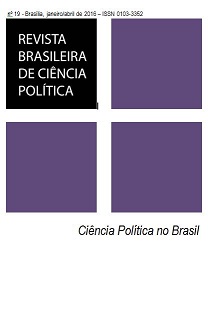Em defesa das valências: uma réplica
Resumo
Resumo
O artigo é uma resposta sistemática e detalhadas à s críticas que Luis Felipe Miguel fez em artigo recente à metodologia da análise de valência (MAV). Segundo o autor: (1) a MAV confunde emissor, receptor, pesquisador e objeto do discurso; (2) reduz drasticamente a complexidade do processo comunicativo; (3) reproduz o ideal normativo da imparcialidade
jornalística; (4) está sujeita à excessiva subjetividade. Pretendo mostrar que esses argumentos arrolados por Miguel contra a MAV são, quando não equivocados, superficiais. Contra suas críticas argumento que: (1) estudos de valência focam somente o emissor, sem prejuízo para a análise; (2) reduzem complexidade como outras metodologias em ciências sociais; (3) não dependem do pressuposto da imparcialidade para serem feitos; (4) estão
menos sujeitos à s distorções subjetivas do que metodologias de estudo da mídia como análise de agendamento e de enquadramento, preconizadas por Miguel.
Palavras-chave: análise de valências, estudos de mídia, estudos eleitorais, objetividade, viés de mídia.
Abstract
This article is a reply to the criticism raised by Luis Felipe Miguel in a recent piece against the use of the methodology of sentiment analysis (MSA) in media studies. According to this author, the MSA is flawed because (1) it confuses different levels of communication, chiefly emission with reception; (2) it reduces drastically the complexity of the communicative process; (3) it
adopts unreflexively the normative ideal of journalistic neutrality; and (4) it is plagued with an excess of subjectivism. I intend to show that the points made by Miguel against the MSA are either equivocal or superficial. Against them I argue that the MSA (1) focuses on the content of emission but not reception, and that does not stop it from producing meaningful results; (2) reduces the complexity of its subject matter like all other scientific methodologies, and
does it in a way that is appropriate to the nature of its subject matter; (3) does not depend on the premise of journalistic neutrality to be valid; and (4) is less subjected to the distortions introduced by the excess of subjective judgement calls than other concurring methodologies such as agenda setting and frame analysis, both advocated by Miguel.
Keywords: sentiment analysis, media studies, election studies, objectivity, media bias.


